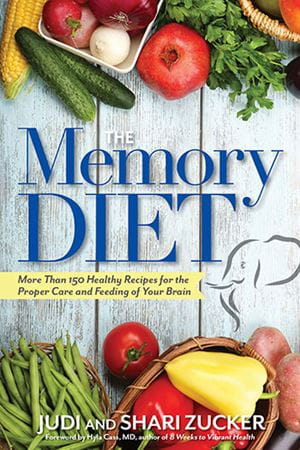
According to the World Health Organization, there are over 47 million people living with dementia and Alzheimer’s disease. Dementia kills more people than breast and prostate cancer combined. Every minute someone in America develops the disease, for which there is no known cure. However, there is hope! Dementia is not a normal part of aging and there are lifestyle choices that you can make to decrease your chances of developing dementia by over 50 percent!
The Memory Diet shows what you can do, nutritionally, to prevent and slow down cognitive decline. The Memory Diet centers around the plant based part of the MIND Diet. The MIND diet stands for Mediterranean Intervention Neurodegenerative Delay and originated from a study at Rush University Medical Center in Chicago. It is a hybrid of the Mediterranean Diet and the Dietary Approaches to Stop Hypertension (DASH). The MIND diet encourages eating a plant-based diet that consists of green leafy vegetables, nuts, berries, beans, whole grains and olive oil. It omits red meat, butter, cheese, pastries and fried foods. The MIND diet can reduce the risk of developing Alzheimer’s disease by 53 percent.
"The Memory Diet" includes the seven brain boosting food groups. These groups are: cruciferous vegetables and cabbage, leafy greens, seeds and nuts, fruits, grapes and berries, beans and whole grains, olive, coconut and avocado oils, and brain spices.
The first group is cruciferous vegetables and cabbage that contain lignans, which have been shown to benefit assorted brain functions, such as thinking, reasoning, remembering, imagining and learning new words.
The second group, leafy greens like spinach, collard greens, romaine and red leaf lettuce are high in folic acid that improves cognition function.
The third group is seeds and nuts, which are high in omega-3 fatty acids that provide many benefits, including improving learning and helping to fight against such mental disorders as depression and mood disorders. Fish is high in Omega 3’s but it can also be high in mercury and other toxic chemicals found in our polluted oceans. Instead of fish, "The Memory Diet" recommends getting omega-3 fats from nuts such as almonds, walnuts, flax seeds, pumpkin seed and chia seeds.
The fourth group is fruits, grapes and berries, which contain antioxidants and anthocyanin that protect the brain from damage caused by free radicals. Blueberries contain flavonoids, compounds that enhance memory. Blueberries have high concentrations of antioxidants and phytonutrients. These compounds prevent cell damage by neutralizing radicals, while preventing inflammation that helps protect against cancer, chronic heart disease and dementia. Inflammation is a known cause of Alzheimer’s.
The fifth group is beans, legumes, and whole grains, which are excellent sources of complex carbohydrates. These complex carbohydrates are also mixed with fiber that slows absorption, giving us a steady supply of glucose for the brain without the risks of sugar spikes associated with many other sugar sources.
The sixth group includes olive, coconut, and avocado oils. Extra-virgin olive oil contains a type of natural phenolic compound called oleocanthal that has antioxidant properties which help shuttle abnormal Alzheimer’s disease proteins out of the brain. Coconut oil has medium-chain triglycerides (MCTs) which are broken down into ketones. Higher ketone values have been associated with greater improvement in Alzheimer’s patients.
The seventh group is brain spices, which include a great variety of brain-friendly compounds. For example, turmeric is a staple spice in Asian and Indian cuisines and is best known as part of curry powder. India has the highest turmeric consumption and lowest rate of Alzheimer’s in the world. Curcumin is a plant-based chemical found in turmeric that inhibits a neurotoxin that has been linked to neurodegenerative disorders and shows promise as both an antioxidation and anti-inflammatory agent. Black pepper is the most widely used spice on the planet and it contains piperine, which can help inhibit the breakdown of dopamine and serotonin which are neurotransmitters crucial to brain health and mood. Garlic and ginger help promote blood flow to the brain. Cinnamon boosts the activity of the brain by removing nervous tension.
When preparing brain-boosting foods, it’s important to cook them properly. Preparing foods that are fresh, local, and organic are the ideal fuel foods for the brain. Cooking methods that use high temperatures to brown or char foods, such as grilling, roasting, and broiling are not good for the brain because they contain glycotoxins called advanced glycation end products (AGEs). A study completed by Icahn School of Medicine at Mount Sinai Hospital showed that diets high in AGEs are a risk factor in developing age-related dementia.
It is well known that a healthy, plant-based diet is good for the body. We now know that it is vital to brain health.

